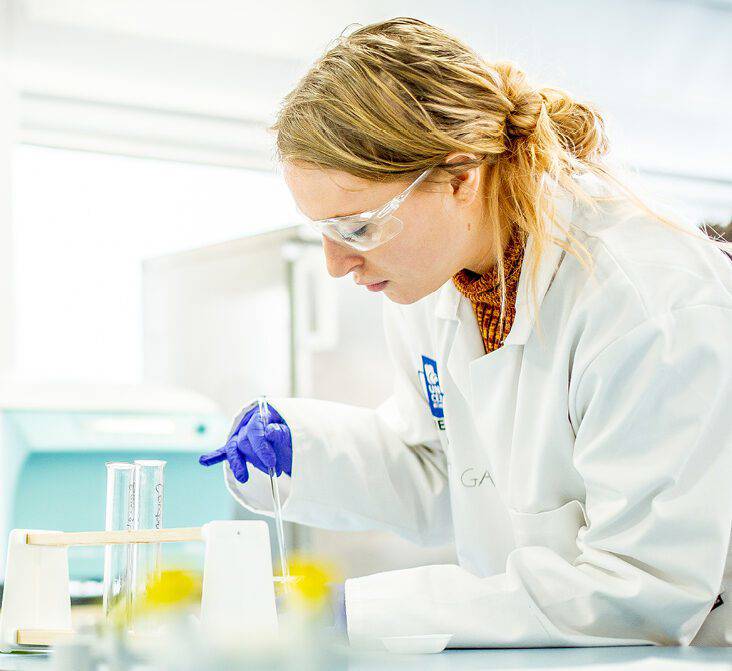Our Level 5 Technician Scientist Apprenticeship in Biomedical and Pharmaceutical Sciences equips aspiring professionals with the advanced scientific skills and knowledge required to support research, development, and quality assurance within the healthcare and life sciences sectors.

Apprentices play a critical role in laboratory-based investigations, contributing to the discovery, testing, and production of medicines, diagnostics, and biomedical technologies. Combining academic study with hands-on experience, this apprenticeship develops expertise in analytical techniques, regulatory compliance, and scientific reporting, preparing individuals for progression into senior technical roles or further study in biomedical and pharmaceutical science disciplines.
Enrolling in the Technician Scientist Level 5 apprenticeship offers the benefit of earning a salary while gaining an industry-recognised qualification and valuable practical experience in a laboratory setting, paving the way for career progression and potential professional registration. Throughout the apprenticeship, you will acquire a diverse range of technical skills, including laboratory techniques, data analysis, and instrument handling, alongside essential transferable skills like communication, problem-solving, and teamwork. This comprehensive training equips you with the knowledge and abilities to excel as a technician scientist and contribute meaningfully to the scientific community.
You will need exposure to relevant workplace experience in order to gather evidence that meets the Knowledge, Skills, and Behaviours outlined in the Professional Standard.
While Maths and English Functional Skills are optional, you will need one of the following qualifications to be eligible:
If you're passionate about science and looking to further your career in the workplace, the Technician Scientist Level 5 Apprenticeship might be the perfect opportunity for you. This unique programme allows you to earn a salary while you learn, combining hands-on experience in real laboratory settings with an industry-recognised qualification equivalent to a foundation degree. Whether you're looking to enter the science industry straight from school or considering a new direction, this apprenticeship provides the ideal foundation for both professional growth and academic progression.
You'll gain practical, job-ready skills - from running experiments and analysing data to managing projects and writing technical reports. Alongside this, you'll build confidence in communication, teamwork, and critical thinking, all while developing a strong understanding of health and safety, quality standards, and scientific problem-solving. With access to a professional network and the chance to contribute to real innovation, this apprenticeship doesn’t just prepare you for a job - it sets you on a meaningful and exciting career path.
STEM Toolkit – both pathways – 20 credits
The purpose of this module is to enable apprentices to acquire and develop a range of skills, especially focussed on the STEM 7 skills: creative thinking, communication, problem solving, investigative, data interpretation, team working and organisational skills.
Biomolecules and cells – both pathways – 20 credits
This module will allow apprentices to explore the structure of the fundamental building blocks of life and explore the structure of Eukaryotic and Prokaryotic cells, gaining an understanding of basic cellular processes.
Integrated Practical Skills – both pathways– 20 credits
This module will cover key practical techniques commonly used in chemical and biological laboratories. The apprentices will have the opportunity to use a range of equipment in the laboratory and develop confidence and competence in performing several standard, industrially relevant procedures.
Data Analysis – both pathways– 20 credits
This module will develop the knowledge of statistical techniques and procedures and enable apprentices to select the most appropriate data analysis techniques and apply them in scientific contexts.
Anatomy and Physiology (for the Biology Pathway) – 20 credits
This module allows apprentices to gain an understanding of the anatomy and physiology of normal tissues, organs and systems of organs and describe major pathophysiological conditions.
Biochemistry (for the Biology Pathway) – 20 credits
This module will cover the major biochemical processes which occur inside all cells. The apprentices will explore how complex biochemical pathways work and contribute to cellular function.
Physical and Inorganic Chemistry (for the Chemistry Pathway) – 20 credits
This module covers a broad range of fundamental concepts in chemistry and introduces topics that will be important for apprentices giving the opportunity to further develop important practical skills.
Organic Chemistry (for the Chemistry pathway) – 20 credits
This module covers topics in organic chemistry, especially those of relevance to life science. The module will explore the chemistry of common organic compounds as well as giving apprentices the opportunity to experience some synthetic and analytical practical activities.
Pharmacology and Therapeutics – both pathways – 20 credits
This module provides knowledge regarding the interaction of drugs with the metabolic pathways in the human body including aspects of delivery and bioavailability.
Microbiology and Biotechnology (for the Biology Pathway) – 20 credits
This module will develop core knowledge about microorganisms and their growing role in industrial processes across various industries, such as Healthcare, the Pharmaceutical and Biotechnology sectors. It will also give apprentices the chance to learn new skills, such as the aseptic technique, the use of specific staining methods for diagnosis purposes.
Immunology (for the Biology Pathway) – 20 credits
This module aims to develop the knowledge of the human immune system. The apprentices will explore how the immune system works and how the body is prepared to defend itself and develop immune learning from early life.
Genetics (for the Biology Pathway) – 20 credits
This module will develop knowledge of the structure, function and organisation of nucleic acids, how physical characteristics are inherited between generations, and how mutations affect prokaryotic microorganisms, plants and animals.
Analytical Chemistry (for the Chemistry pathway) – 20 credits
This module provides a background in the standard techniques used to gain information about the identity, purity and composition of chemical substances as well as the mathematical procedures used to assess the validity and reliability of data collected by these methods.
Medicinal Chemistry (for the Chemistry pathway) – 20 credits
This module is designed to allow apprentices to study some aspects of chemistry that are particularly relevant to medical and pharmaceutical industries. It will cover the chemistry involved in drug design and provide a brief introduction to the strategic planning involved in drug synthesis.
Biomaterials (for the Chemistry pathway) – 20 credits
This module provides a background in materials chemistry, delivered in a specific context that will benefit those apprentices wishing to progress to further study or employment in any field that involves biomaterials.
Work Related Learning – this module is studied in the workplace – 20 credits
This module will provide apprentices with the opportunity to identify and analyse a solution to a work-related problem and to reflect on their overall learning experience.
Scientific Investigation - this module is studied in the workplace– 20 credits
This module develops an understanding of how cellular, biochemical and chemical processes can be investigated. It also allows apprentices to experience the practical development of their proposed project and increases their confidence in working in a laboratory.
You will be assessed throughout the duration of your apprenticeship. Assessment methods include laboratory reports, presentations, reflective journals, research projects, practical tasks, formal examinations.
To conclude your apprenticeship, you will complete an End-Point Assessment (EPA). This involves:
You will attend the University Centre Leeds on a day release basis for three years to complete the qualification. The remainder of the time will be in the workplace building a portfolio of evidence for the End-Point Assessment portfolio. Evidence for the portfolio can be provided through a range of sources, e.g., performance review documentation, witness statements, training records/certificates, work products such as risk assessments, reports, meeting records, plans etc. The assessor/reviewer will visit the workplace at regular intervals for the duration of the apprenticeship.
Upon successful completion of this apprenticeship, you could go on to complete the Level 6 Degree Scientist apprenticeship or continue employment in your current field. Job opportunities this apprenticeship may open include:







